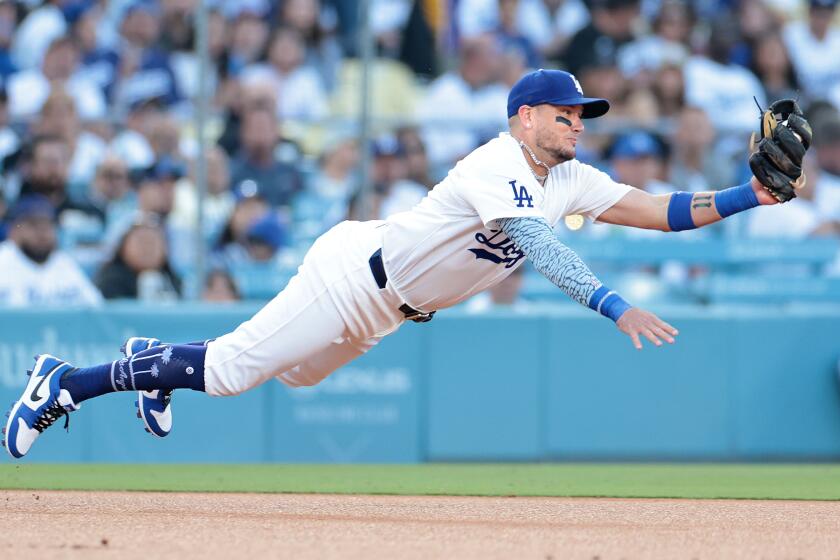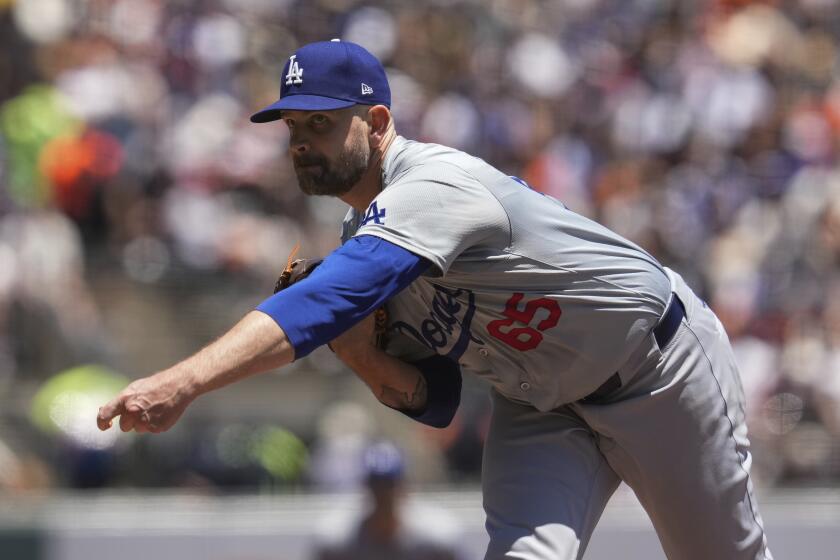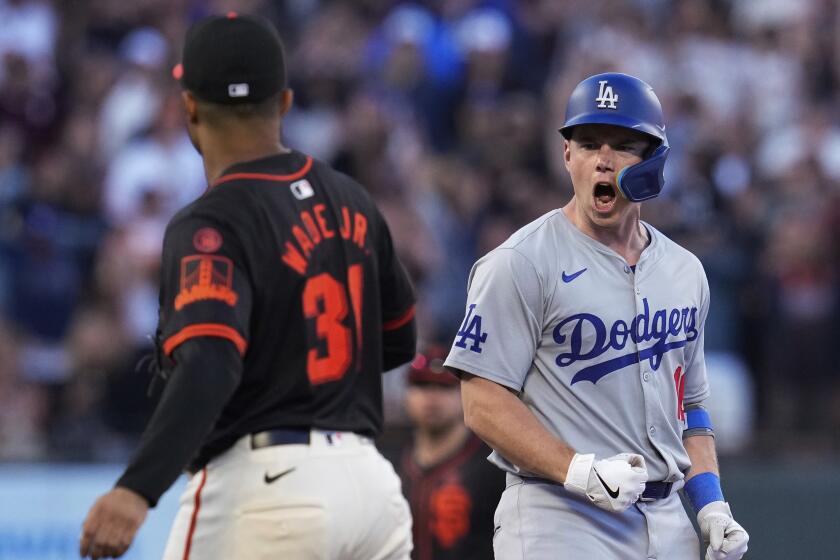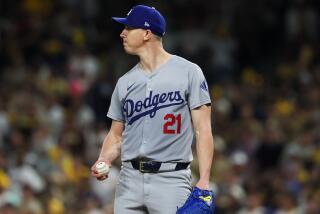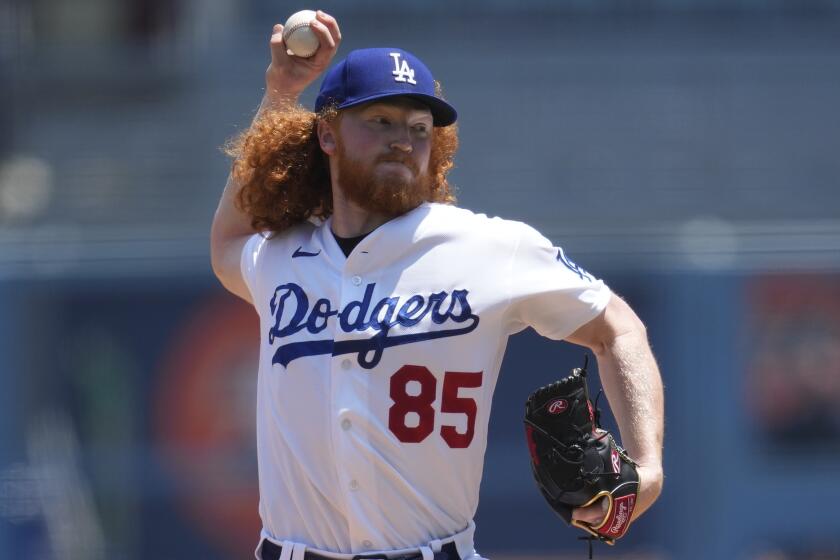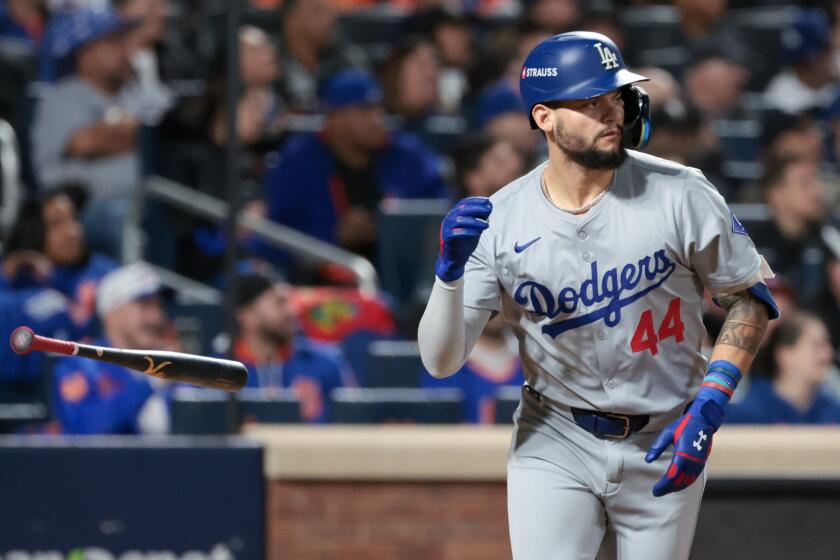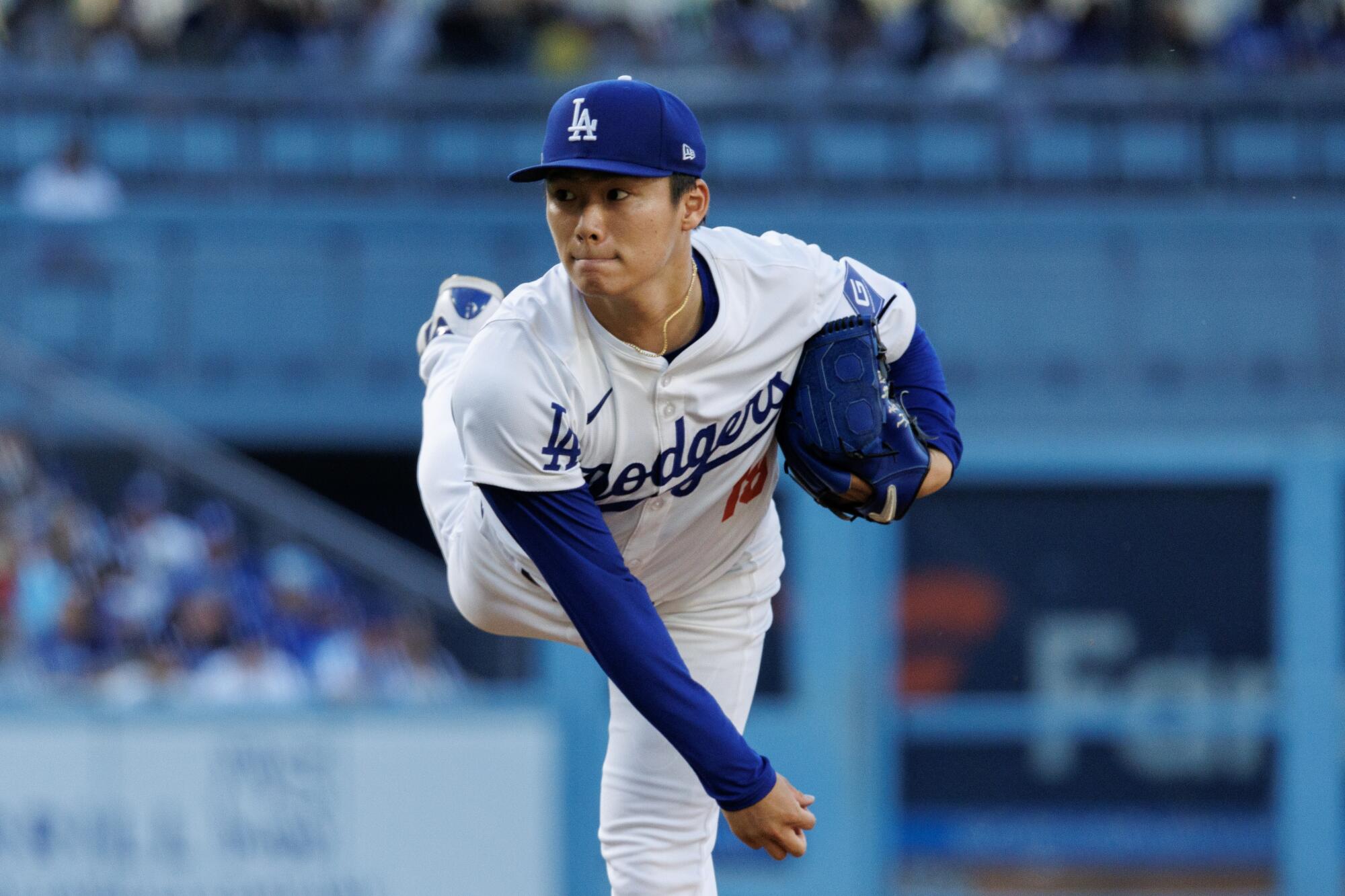
It took just three days last month for the Dodgers pitching staff to be thrown in flux.
Three days for a seemingly harmless situation to devolve into the clubâs latest injury-induced roster dilemma.
In mid-June, Yoshinobu Yamamoto was coming off his best outing as a Dodger when he reported shoulder soreness. At first, club officials were confident it was nothing serious. After all, rookie right-hander had just dominated the New York Yankees with the kind of spotless command and premium stuff that convinced the Dodgers to sign him for $325 million in the offseason.
Since taking over for the injured Mookie Betts at shortstop, Miguel Rojas has reminded the Dodgers just how valuable he can be at the plate and in the field.
Following that season-high, 106-pitch outing, it stood to reason the 25-year-old â who already was adjusting to a more frequent pitching schedule than his once-a-week routine in Japan â would feel a little sore.
âIt felt very benign,â general manager Brandon Gomes said. âThat happens for guys all the time.â
This time, however, it was something more. Yamamoto suffered a strained rotator cuff, which forced him to depart his next start early and has kept him off the mound for two weeks. His timeline to return remains unclear. And even if he does come back before the end of the season, as the Dodgers expect, itâs no guarantee heâll look like the pitcher who started the season with a 2.92 earned-run average, or teased flashes of frontline dominance in the Bronx.
For a team accustomed to midseason pitching injuries, Yamamotoâs absence served as the latest blow.
âWe know that pitcher injuries are an occupational hazard right now,â Dodgers president of baseball operations Andrew Friedman said earlier this year. But in the Dodgersâ case, theyâve become a recurring roadblock in their pursuit of another World Series championship.
Emmet Sheehan underwent Tommy John surgery in May. Walker Buehler has been sidetracked in his return from the same procedure. Clayton Kershaw recently halted his rehab assignment amid his recovery from offseason shoulder surgery. Dustin May is continuing to work his way back from an elbow surgery he had last summer.
Not to mention their top offseason acquisition, Shohei Ohtani, is recovering from an arm injury too.
Just like the last three years, when the Dodgers were left reeling from midseason losses in the starting rotation, they again find themselves in need of another frontline pitcher with the trade deadline just four weeks away.
Itâs an unexpected position for a team that already spent roughly $1.4 billion in the offseason â including more than $500 million on starting pitching â a team that has long been wary of inflated deadline trade costs and that might have few enticing options to pursue.
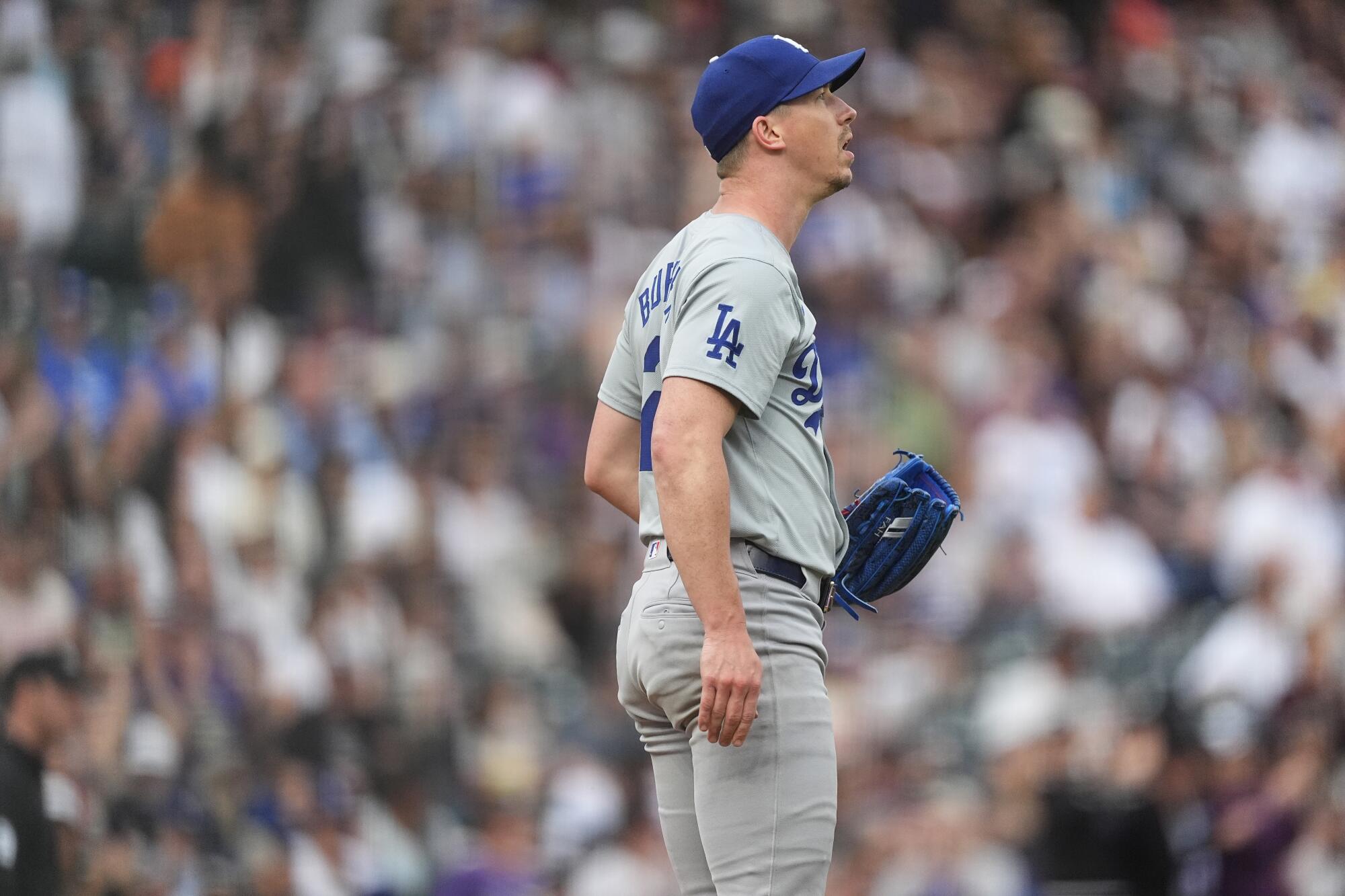
But it also feels like deja vu, leaving the Dodgers with two questions theyâve struggled to answer for years. Why have they repeatedly been hit so hard by pitching injuries? And when is the right time to pursue potentially pricey reinforcements â and at what cost?
The first question has haunted the Dodgers in recent seasons, the team at the forefront of the sportâs growing epidemic of pitching injuries.
In 2021, there were season-ending elbow injuries to Kershaw and May (while the team also lost Trevor Bauer amid allegations of sexual assault). In 2022, Buehler underwent his second Tommy John surgery, while Tony Gonsolin never fully recovered from a forearm strain.
Last season the setbacks intensified. It started with more injuries to May (elbow surgery), Gonsolin (Tommy John surgery) and Kershaw (shoulder surgery). There was a failed comeback attempt by Buehler. Opening-day starter Julio UrĂas missed a chunk of the campaign because of a hamstring injury (then was arrested on suspicion of domestic violence, finishing the season on administrative leave).
In all, Dodgers pitchers have managed at least 25 starts in a season just four times in the last three years (Buehler and UrĂas in 2021, UrĂas and Tyler Anderson in 2022).
Over the last five years, theyâve had seven pitchers undergo Tommy John surgery, a total that ranks in the top third of the league, according to a database compiled by baseball researcher Jon Roegele.
Injuries to their homegrown pitchers have been particularly frustrating. The 10 starting pitching prospects the club has shepherded to the majors since 2017 (Buehler, May, Gonsolin, Sheehan, Ryan Pepiot, Mitch White, Michael Grove, Bobby Miller, Gavin Stone and Kyle Hurt), have spent more than 45% of their collective service time in L.A. on the injured list â a combined total of nearly 1,700 days lost to a litany of pitching injuries.
James Paxton struggles and Shohei Ohtani strikes out three times as the Dodgers lose in a 10-4 blowout to drop their three-game series against the Giants.
âThere are a lot of factors that are involved,â Friedman said, arguing those woes reflect a larger trend around the sport, which has incentivized pitchers to push the limits of their bodies in search of higher fastball velocities and breaking ball spin rates.
âBut the point is,â Friedman added, âitâs too much.â
So much so that, in the Dodgersâ eyes, the question of pitching injuries is no longer an if, but a when.
â[Itâs] not if youâre gonna have pitcher injuries,â Friedman said. âItâs about having enough talent, appreciating injuries are going to happen, and trying to have enough depth to withstand the injuries when they happen.â
In the wake of Yamamotoâs shoulder strain, the Dodgers could be forced into another patchwork starting pitching plan.
They have an established ace in Tyler Glasnow, who has managed to shake his injury-prone reputation by going 8-5 with a 3.23 ERA in 17 starts.
They have a potential emerging star in Stone, the rookie right-hander flashing frontline stuff with increasing consistency en route to a 9-2 record and 2.73 ERA.
They should possess enough depth to get through the rest of the regular season. James Paxton, Landon Knack and Miller are filling out the rotation. Yamamoto, Buehler, May and Kershaw all could return. Top prospects like Hurt, River Ryan and Justin Wrobleski could contribute during the stretch run.
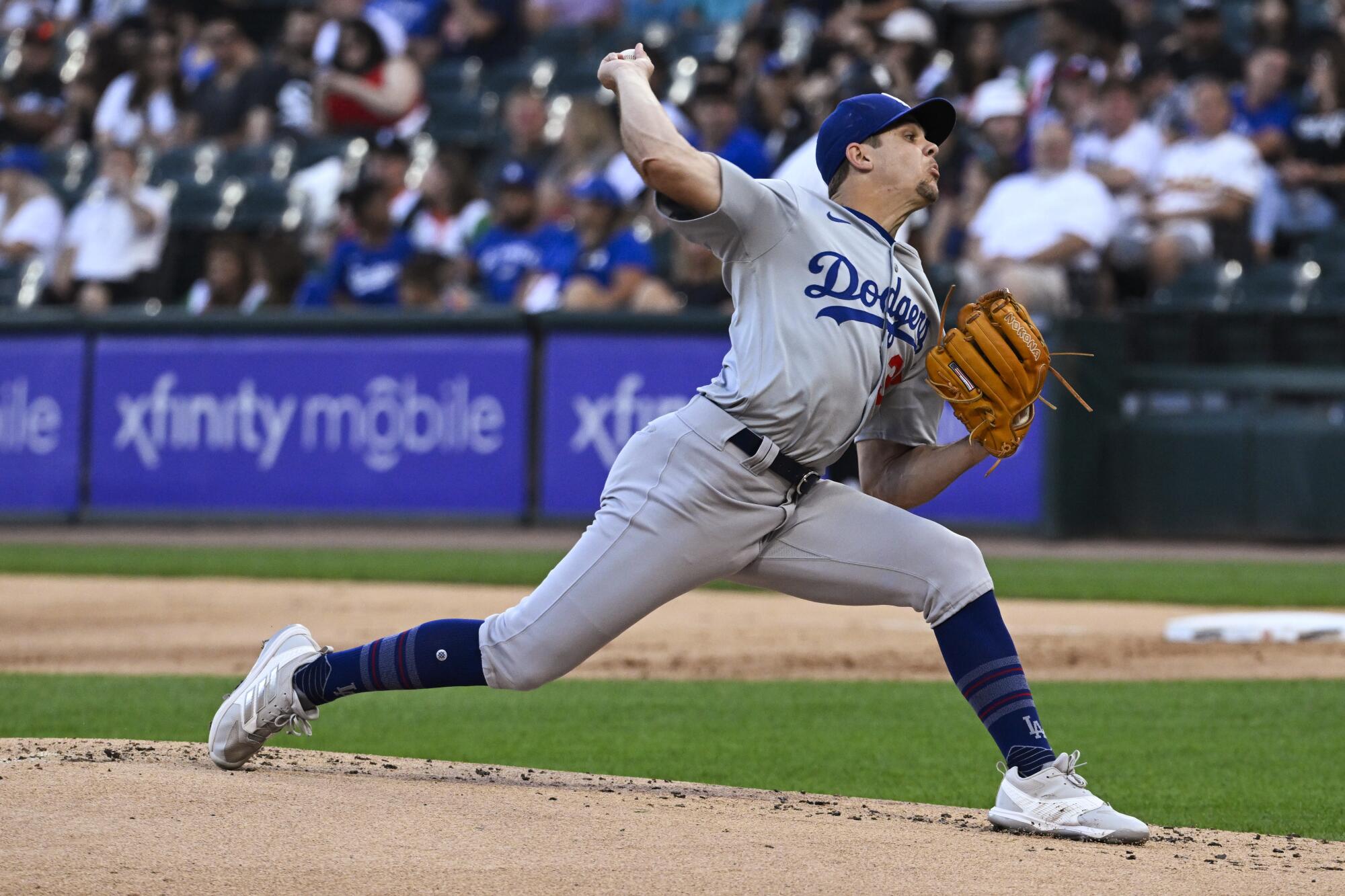
Still, come October, a rotation that was designed to feature two aces in Glasnow and Yamamoto is instead in danger of being short on frontline firepower.
And while the Dodgers could opt to trust their depth and rely on the totality of their staff to help them navigate the postseason, they will approach the trade deadline in an uncomfortably familiar spot: needing one more top arm to round out their roster.
Acquiring one could come at an inflated cost.
The last time the Dodgers made a big deadline splash for pitching help, it almost worked.
In 2021, as the defending World Series champions, they acted boldly in the wake of losing Bauer, May and Kershaw, swinging a deadline trade for three-time Cy Young Award winner Max Scherzer in a blockbuster deal with the Washington Nationals.
Scherzer nearly helped the Dodgers get back to the Fall Classic â until he was scratched from their season-ending Game 6 loss in the National League Championship Series because of arm fatigue.
Three years later, that remains the closest the Dodgers have come to capturing another elusive title.
In other recent postseason failures, their lack of top starting pitching has been a common pitfall.
In 2022, the team never managed to replace Buehler after he had surgery.
Last year a low-profile deal for Lance Lynn did little to salvage a staff that was again missing Buehler and May and leaning heavily on Kershawâs compromised shoulder.
This season the Dodgers are back in a similar situation, again mulling over expensive deadline pitching targets.
That dynamic already appears to be influencing their interest in Chicago White Sox left-hander Garrett Crochet.
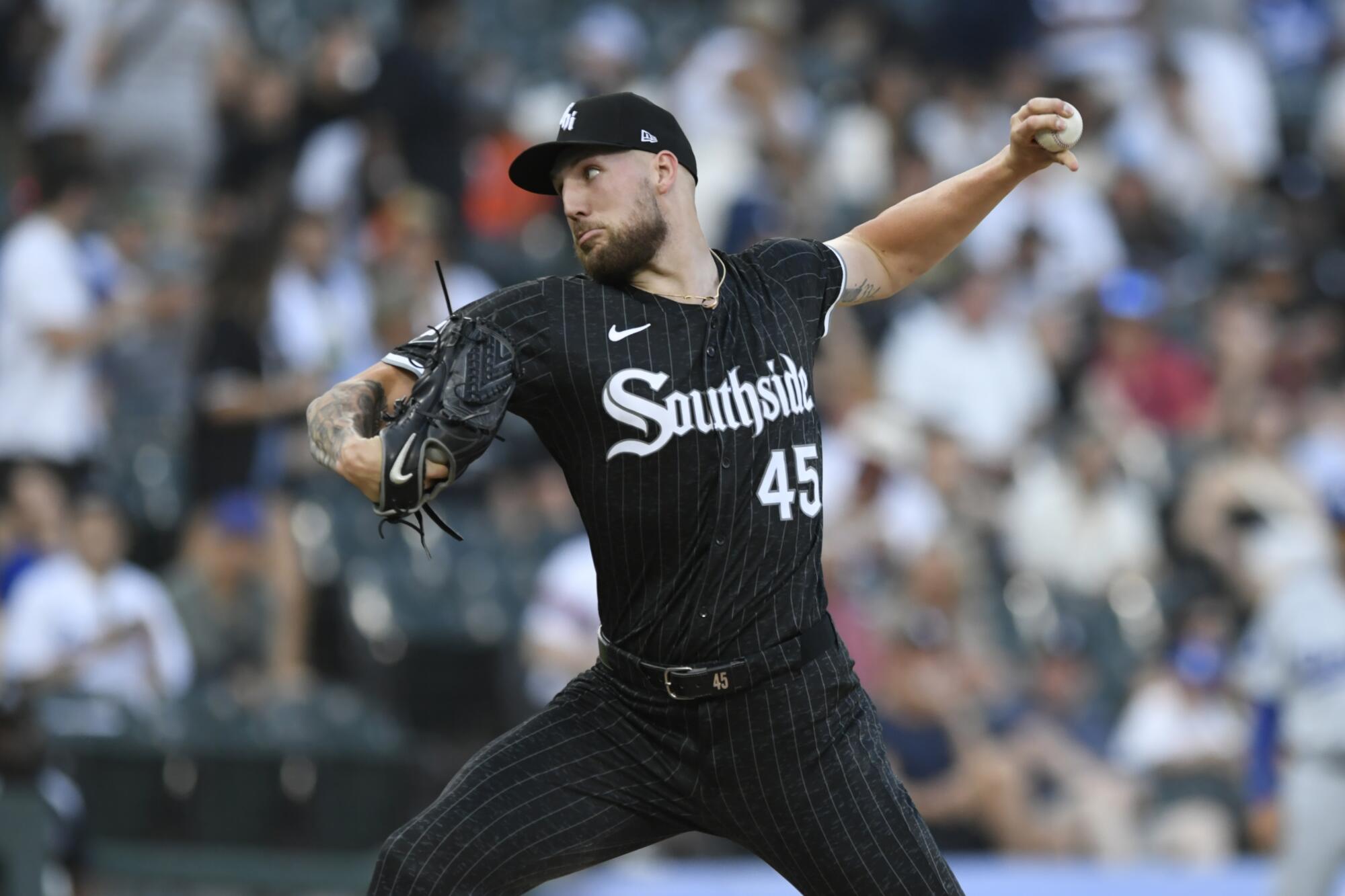
In 18 outings, the 25-year-old Crochet is 6-6 with a 3.02 ERA. He leads the American League with 141 strikeouts. And, with his upper-90s fastball and imposing 6-foot-6 frame, he represents one of the few enticing options available on the trade market (though he could face an innings restriction over the rest of the year, having almost doubled his career-high workload).
In what is shaping up to be a sellerâs market, the White Sox reportedly are driving a hard bargain.
Crochet has two seasons of team control remaining, which has caused his price to skyrocket. For comparison, the White Sox received three of the San Diego Padresâ top 10 prospects in a trade this year for fellow starter Dylan Cease â and Cease has only one year of team control left.
That hasnât scared off the Dodgers. USA Today reported the team made an offer for Crochet that was rejected by the White Sox.
The sides arenât believed to be close to a deal, according to a person with knowledge of the situation who wasnât authorized to speak publicly. And for a Dodgers club that under Friedman has been wary of overpaying for players at the deadline, lining up a deal for a player the caliber of Crochet could prove to be a long shot.
The Dodgers were precariously close to losing in another walk-off to San Francisco before surging for seven runs in the 11th inning of a 14-7 win.
There are other alternatives to consider. Jack Flaherty, a Dodgers trade target in years past, is a pending free agent having a strong year for the Detroit Tigers. Anderson, the former Dodgers starter, is having a resurgent season with the Angels (though also with another year left on his contract).
More names might surface as potential options as more teams drop out of contention and start looking to sell. For now, though, the Dodgers are experiencing injury woes for a fourth consecutive season, left with pitching needs that only a deadline addition might fix.
And in the next four weeks, theyâll have to chart their course for the rest of the regular season, having to decide whether to pull the trigger on a major deal or roll the dice with the thinning depth and talent their staff has left.
More to Read
Are you a true-blue fan?
Get our Dodgers Dugout newsletter for insights, news and much more.
You may occasionally receive promotional content from the Los Angeles Times.

